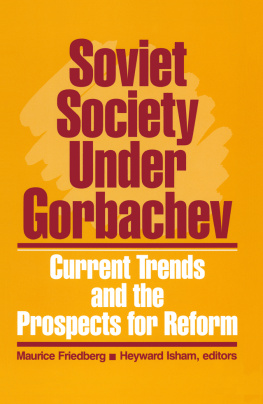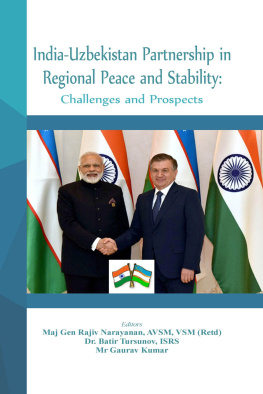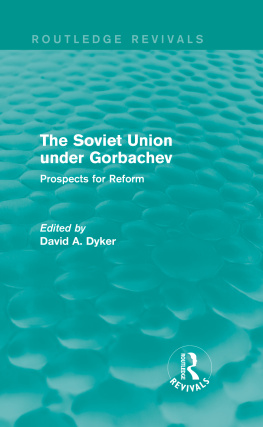Maurice Friedberg - Soviet Society Under Gorbachev: Current Trends and the Prospects for Change: Current Trends and the Prospects for Change
Here you can read online Maurice Friedberg - Soviet Society Under Gorbachev: Current Trends and the Prospects for Change: Current Trends and the Prospects for Change full text of the book (entire story) in english for free. Download pdf and epub, get meaning, cover and reviews about this ebook. year: 2016, publisher: Routledge, genre: Home and family. Description of the work, (preface) as well as reviews are available. Best literature library LitArk.com created for fans of good reading and offers a wide selection of genres:
Romance novel
Science fiction
Adventure
Detective
Science
History
Home and family
Prose
Art
Politics
Computer
Non-fiction
Religion
Business
Children
Humor
Choose a favorite category and find really read worthwhile books. Enjoy immersion in the world of imagination, feel the emotions of the characters or learn something new for yourself, make an fascinating discovery.
- Book:Soviet Society Under Gorbachev: Current Trends and the Prospects for Change: Current Trends and the Prospects for Change
- Author:
- Publisher:Routledge
- Genre:
- Year:2016
- Rating:4 / 5
- Favourites:Add to favourites
- Your mark:
- 80
- 1
- 2
- 3
- 4
- 5
Soviet Society Under Gorbachev: Current Trends and the Prospects for Change: Current Trends and the Prospects for Change: summary, description and annotation
We offer to read an annotation, description, summary or preface (depends on what the author of the book "Soviet Society Under Gorbachev: Current Trends and the Prospects for Change: Current Trends and the Prospects for Change" wrote himself). If you haven't found the necessary information about the book — write in the comments, we will try to find it.
Maurice Friedberg: author's other books
Who wrote Soviet Society Under Gorbachev: Current Trends and the Prospects for Change: Current Trends and the Prospects for Change? Find out the surname, the name of the author of the book and a list of all author's works by series.
Soviet Society Under Gorbachev: Current Trends and the Prospects for Change: Current Trends and the Prospects for Change — read online for free the complete book (whole text) full work
Below is the text of the book, divided by pages. System saving the place of the last page read, allows you to conveniently read the book "Soviet Society Under Gorbachev: Current Trends and the Prospects for Change: Current Trends and the Prospects for Change" online for free, without having to search again every time where you left off. Put a bookmark, and you can go to the page where you finished reading at any time.
Font size:
Interval:
Bookmark:

2 Park Square, Milton Park, Abingdon, Oxon OX14 4RN
711 Third Avenue, New York, NY 10017, USA
No responsibility is assumed by the publisher for any injury and/or damage to persons or property as a matter of products liability, negligence or otherwise, or from any use of operation of any methods, products, instructions or ide as contained in the material herein.
Bibliography: p.
Includes index.
Contents: The family in the Soviet Union / Mark G. Field Labor problems and the prospects for accelerated economic growth / Vladimir Kontorovich A noble experiment? / Vladimir Treml [etc.]
1. Soviet UnionSocial conditions1970- Congresses. 2. Soviet UnionPolitics and government1982- Congresses.
I. Friedberg, Maurice, 1929
II. Isham, Heyward.
HN523.5.S685 1987 947.085'3 87-16572
ISBN 13: 9780873324427 (hbk)
| / Maurice Friedberg |
| / Mark G. Field |
| / Vladimir Kontorovich |
| / Paul A. Goble |
| / Anthony Olcott |
| / Ellen Mickiewicz |
| / Heyward Isham |
Font size:
Interval:
Bookmark:
Similar books «Soviet Society Under Gorbachev: Current Trends and the Prospects for Change: Current Trends and the Prospects for Change»
Look at similar books to Soviet Society Under Gorbachev: Current Trends and the Prospects for Change: Current Trends and the Prospects for Change. We have selected literature similar in name and meaning in the hope of providing readers with more options to find new, interesting, not yet read works.
Discussion, reviews of the book Soviet Society Under Gorbachev: Current Trends and the Prospects for Change: Current Trends and the Prospects for Change and just readers' own opinions. Leave your comments, write what you think about the work, its meaning or the main characters. Specify what exactly you liked and what you didn't like, and why you think so.










